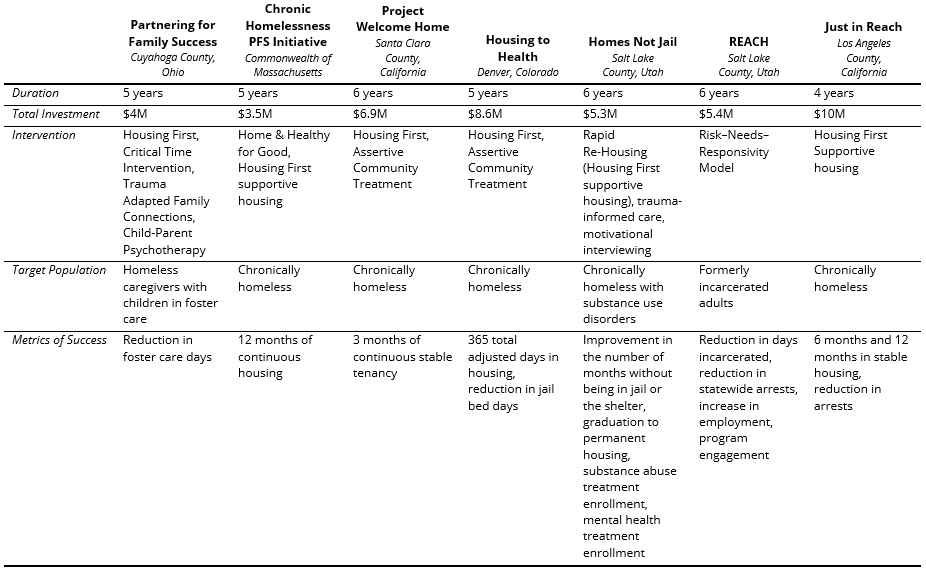Using Pay-For-Success Financing For Supportive Housing Interventions
Overview
Paula Lantz and Samantha Iovan of the University of Michigan Research Hub published new findings in Behavioral Science & Policy as part of their ongoing study of pay for success (PFS) financing models for evidence-based interventions aimed at the social determinants of health. Lantz and Iovan used their innovative PFS surveillance system to identify strengths and challenges of several supportive housing interventions using PFS, and to assess whether PFS housing projects generally meet established criteria for improving social welfare.
Findings
As of May 1, 2018, 21 housing-related PFS projects have been launched globally, of which seven are in the U.S.:

All seven PFS housing projects include the delivery of evidence-based interventions to marginalized groups with complex needs. With the exception of REACH in Salt Lake County, all the projects use a housing-first approach combined with some variant of permanent or long-term supportive housing.
They deliver a range of supportive services to address the complex psychosocial, behavioral, and medical needs of the target population. Both nonprofit and for-profit investors have provided capital, and key agencies and organizations in the field of housing, including the Corporation for Supportive Housing, the Reinvestment Fund, and Enterprise Community Partners, have been involved in many of the projects. Success payments to the private investors are contingent on some measure of sustained housing in all but two projects.
Implications for Policy and Practice
Although PFS is in the early stages of development, evidence suggests it holds promise as a way to finance housing, a critical component of health and social equity. The long-term social, behavioral, and health impacts of these projects are not yet known, but it does appear that PFS has opened the door for evidence-based program delivery to populations who may not otherwise be served via traditional funding mechanisms. Although the early results are promising, the final evaluations will more fully reveal the potential of PFS financing for behavioral-based supportive housing and other social welfare interventions in high-need populations.
Related Evidence
-
Published October 31, 2018View Evidence
Steven H. Goldberg, Paula M. Lantz, and Samantha Iovan from the University of Michigan P4A Research Hub examine the use of federal Medicaid dollars as a payout source for non-medical services aimed at addressing social determinants of health under the 2016 Medicaid Managed Care Final Rule.
-
Published September 25, 2018View Evidence
The Pay for Success model may prove to be a valuable tool for increasing critical investments in effective health and wellness interventions. The public-private nature of the approach can encourage important ties between the business community, investment groups, philanthropy, and public agencies and service systems; and stimulate innovative changes in the financing and delivery of sustainable, community-driven solutions.
-
Published June 5, 2018View Evidence
What kind of cost savings could be achieved if a "Pay for Success" (PFS) financing model were applied to a home-based, multi-component asthma intervention among low-income children on Medicaid in Detroit? The University of Michigan Research Hub team found that the economics of a PFS intervention are most viable if it targets children who have already experienced an expensive episode of asthma-related care.
Related Projects
-
Financing, Implementation & Policy Models"Pay for Success" Financing of Home-Based Childhood Asthma Interventions: Modeling Results From the Detroit Medicaid Population
June 5, 2018
|Evidence
| -
Financing, Implementation & Policy ModelsPay For Success And Population Health: Projects Reveal Challenges And Promise
September 25, 2018
|Evidence
|